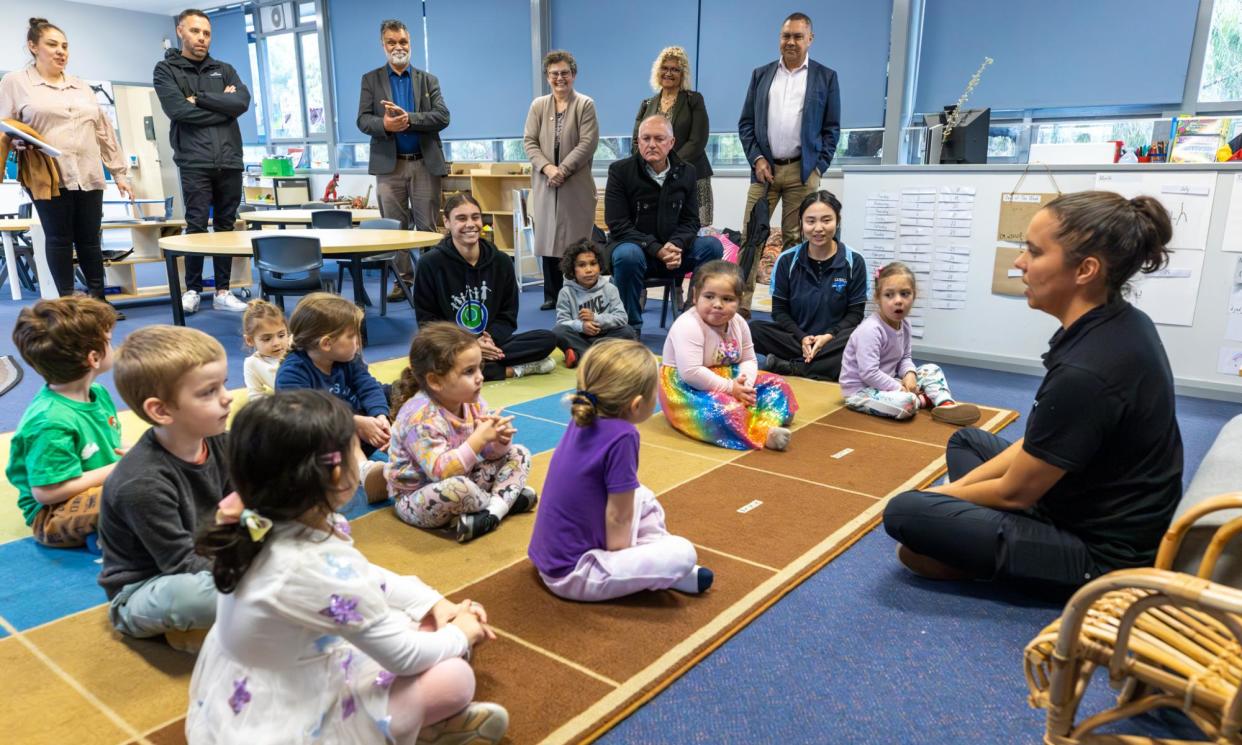Schools funding and reforms panel: five key takeaways

An expert panel has released its much-anticipated review into Australia’s education system which is set to inform the next five years of funding and reforms.
Education ministers will now begin negotiations on the next national school reform agreement (NSRA), which was delayed until 2025 for the review to be conducted.
Over the course of the year, the panel, chaired by Dr Lisa O’Brien, visited 92 schools, held more than 130 meetings and surveyed about 25,000 parents, teachers and students.
Here are five key takeaways.
Fully funding public schools
More than a decade since the landmark Gonski review recommended changes to fund Australian schools according to need, 98% of public schools remain under-resourced.
That’s according to the schooling resource standard (SRS), the minimum baseline agreed to by governments for students to access a decent education. Just the ACT has reached it, and on its current trajectory, the NT never will.
Equity is the centrepiece of the report, with its panel noting disadvantaged students are three times more likely to fall behind their classmates, while Australian schools also have some of the highest levels of social segregation among OECD countries.
The panel said full funding to 100% of the SRS was a “critical prerequisite” for successful education reform, learning and wellbeing improvement across the country.
“The uneven playing field and funding shortfalls the Gonski reviews sought to correct persist and need to be addressed,” the report read.
“It is crucial that all governments and school systems aim to achieve 100% of the SRS for every school as soon as possible … in particular, the panel notes the special circumstances of the NT, which may require additional support.”
The Commonwealth has committed to work with state and territory governments to get every school to 100% of the SRS. Negotiations will now begin on when – and if – a target will be introduced.
Screening student progress
The report found too many children were falling behind in early years and failing to catch up to their peers.
It has called for consistent universal screening of student progress in fundamental literacy and numeracy skills from year 1, with targeted programs like small group or individual catch-up tutoring to be offered to children failing to meet standards.
“The significant proportion of students who are falling behind indicates that despite the significant efforts of systems and schools, current approaches are not providing all students with foundational literacy and numeracy skills,” the report read.
“Universal screening is the most effective and cost-efficient way to ensure any student at risk of falling behind in their learning is identified early and given the help they need to catch up.”
The year 1 phonics check would be rolled out to all schools by the end of 2026, with a numeracy check to follow by the end of 2028. The data would be reported nationally.
Schools to act as community hubs
The role of schools as education providers would be radically expanded to better integrate with other community services under the review’s recommendations.
The panel found “far too many students” fell behind because they struggled to access supports they needed, including in allied health.
It cited data suggesting students with poor mental health had more than double the number of absent days than their peers and, by year 9, were up to 2.8 years behind in literacy and numeracy.
“Psychological distress has increased among young people over the last 10 years … in some places, there is a cluttered and fragmented landscape of supports which can be difficult for students, families and schools to navigate,” the report read.
Placing wellbeing at the centre, dedicated in-school functions like speech and occupational therapists and wellbeing coordinators would be offered in schools to provide referrals to counsellors and psychologists.
In addition, the panel has called for a national student wellbeing measure to be implemented by the end of 2028, collecting data on belonging, safety, engagement and classroom disruption.
Addressing workforce shortages
The report has recommended new subject-specific roles for top teachers and learning opportunities to raise the status of the profession to reverse major workforce shortages and retain employees.
The centrepiece is a new national career pathway frameworks to be established by the end of 2027, to recognise accreditation for courses like micro-credentials and better deploy expertise.
It includes the establishment of two new subject-specific roles for teachers, including a school-based ‘instructional specialist’ and region-based ‘master teachers’, selected via a competitive process. The panel also recommended improving access to high-quality teaching resources.
“Many teachers do not feel adequately recognised or valued, despite competitive starting salaries,” the report read. “Better incentives, enhanced career pathways and better employment conditions are needed to attract and retain teachers and school staff.
“Attrition rates are high, with around one in five beginning teachers leaving within the first three years … despite the efforts of school systems and approved authorities, teachers feel overworked.”
Additionally, the panel argued more must be done to ensure the workforce was diverse, including increasing First Nations educators to address cultural safety and racism in schools.
A ‘data custodian’
Too many data gaps exist in the education sector, the panel warned, particularly amongst priority equity cohorts including students with disabilities.
It’s recommended wide-ranging reforms to data collection, transparency and accountability, to better track students and advise the community where needs-based funding is being directed – and how it’s being used.
“There is a lack of transparency and accountability in current funding arrangements tracing back over decades,” the report read.
“Families and communities do not have visibility of how public funding is allocated and expended, particularly in relation to how needs-based loadings flow through to schools.
“Our system is falling short of community expectations of transparency and limit our understanding of how investment or policy changes may impact student outcomes.”
To fill the gaps, an independent body would become a “data custodian” by the end of 2026, tasked with developing a more “mature” approach to governance and data-sharing.


